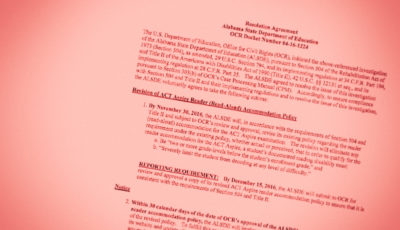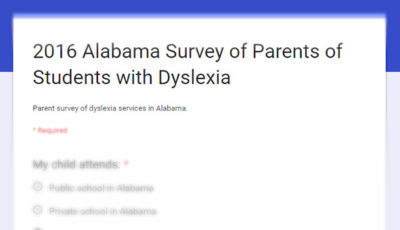Standardized Test Accommodations Yanked after Mid-Year Change in Testing Policy
 This year’s round of standardized testing poses a different kind of challenge for Grace*, a fifth-grade student in Hoover City schools.
This year’s round of standardized testing poses a different kind of challenge for Grace*, a fifth-grade student in Hoover City schools.
The main support that had been provided to help her take those tests has been yanked after the Alabama State Department of Education (ALSDE) changed eligibility requirements for those supports a few months ago.
Knowing that this year’s test scores will not reflect Grace’s true achievement, her mother, Amy, is keeping a good outlook. “The ACT Aspire is not the end-all, be-all,” she said.
Amy chose to share Grace’s experience here because she is worried other parents might not be aware that their child’s accommodation could be taken away due to those changes.
Grace has dyslexia and has been served under a Section 504 plan, which provides access to accommodations to level the playing field with students who do not have dyslexia.
To level that playing field last year, test questions were read aloud to Grace during the math section of the ACT Aspire. Having the questions read aloud ensured that her dyslexia, which affects her reading ability, didn’t interfere with her ability to show what she truly knew in math.
While ACT Aspire does not allow questions to be read aloud for the reading or English portions of the exam, questions can be read aloud for the math, science, and writing portions of the ACT Aspire.
About six weeks ago, Grace’s parents were notified that she would not be allowed to have questions read aloud for this year’s testing. They asked why.
A state department official responded that Grace’s recent reading scores indicated she is reading on grade level, making her ineligible.
To qualify for having questions read aloud (either from a teacher or through a text-to-speech function on a computer), they were told, a student must have demonstrated a reading level to be two grade levels below their enrolled grade. Additionally, a child’s Section 504 plan or Individualized Education Program (IEP) must document the reading disability and include details on how the school is working with the student to master those skills.
After further research, Amy discovered that school officials could not use test results as the sole reason for the accommodation to be denied, citing recent guidance from the U.S. Department of Education (USDOE) for assessing students with dyslexia and other disabilities.
Officials with the state department disagreed with Amy’s interpretation and have so far refused to allow Grace to have test questions read aloud to her for next week’s ACT Aspire testing.
After considering all of her options, Amy filed a complaint with the Office of Civil Rights (OCR) division of the USDOE alleging the state department’s new testing policy conflicts with the Americans with Disabilities Act (ADA) and the guidance issued by the USDOE. The ADA is the governing law for students with Section 504 plans.
An official from the OCR division of the USDOE contacted Amy on Tuesday to confirm they will conduct an investigation.
Though Amy realizes the investigation, which could take up to six months to complete, will not help Grace this year, she is pursuing it in the hopes that the USDOE can determine if the ALSDE should revise their criteria to comply with ADA and USDOE guidance.
Amy is not the only parent of a child with dyslexia who was surprised to learn her child wouldn’t be given the accommodation of having test questions read aloud. This is an active discussion in dyslexia circles, and many parents have expressed their concern about the accommodation being yanked from their child’s IEP this year at the last minute, with no justification.
In November, the ALSDE made changes to the policies and procedures for testing students with special needs.
It is unclear who at the ALSDE recommended and authorized the changes and when school officials were notified of those changes, as ALSDE officials have not responded to repeated requests for answers to those questions.
In February, the ALSDE published a training presentation outlining the new criteria.
In it, slide number eight states more than 10,000 children used the read-aloud accommodation for the ACT Aspire last year, adding that “several years of data from our state assessments show that we are over accommodating students and the students’ test scores are impacted negatively.”
In an e-mail response, Nannette Pence, assessment coordinator for the ALSDE, defined over accommodating as “the selection of the wrong accommodation(s), lack of prior practice by the student, inappropriate accommodations (those that are not related to the student’s disability, and/or too many accommodations),” adding, “accommodations presented on the day of testing, too many accommodations, or inappropriate accommodations can adversely affect the achievement for that student.”
Prior to November, the “two grade levels below” criteria did not exist. Instead, that decision was left to the child’s IEP or Section 504 team to decide on appropriate testing accommodations.
According to guidance from ACT Aspire, states are expected to set criteria for various levels of support for students with disabilities taking the ACT Aspire, stating “Decisions about accommodation-level supports are typically made by an educational team including and on behalf of the student and are normally based on a formal, documented evaluation of specialized need.”
In order to access accommodations on the ACT Aspire, school officials must complete a Personal Needs Profile (PNP) for each student prior to testing.
Regarding the appropriateness of the “two grade levels below” standard, Nancy Anderson, Associate Director of the Alabama Disabilities Advocacy Program, said, “Finding the ‘sweet spot’ where the accommodation is just right to mitigate the effects of the child’s disability is the job of the IEP Team, who should have a thorough understanding of a child’s disabilities and their effect on his/her learning needs”.
Anderson said she would be concerned if the ALSDE has created “any hard and fast policy that entirely removes an IEP team’s discretion,” but couldn’t comment directly on Grace’s case without knowing all of the details.
Correspondence between school officials and Grace’s parents indicate that Hoover City school officials were notified of the changes on December 4, 2015. It is unclear why Grace’s parents weren’t notified until late February of the changes.
At this point, Grace will be able to take the computerized test alongside a small group of students and will have extended time to complete the tests, though Amy worries that the results won’t truly reflect what Grace knows in math and science.
Believing the Section 504 plan didn’t go far enough to protect Grace’s education, her parents have recently requested an evaluation to determine if she is eligible for special education services which could require the school district to provide specialized instruction along with accommodations in testing and other areas.
While Grace told her mother she feels she isn’t being treated fairly, Amy said, “In the end all we really want is for Grace to have the tools and resources at her disposal to show the world and more importantly herself what an amazing person she is and that anything is possible for her bright future!”
*Due to privacy concerns, we are not using Grace’s real name.
UPDATE: This article was updated on April 11 at 10:30 p.m. to say that an official, rather than an attorney, with the USDOE OCR contacted Amy. We apologize for the error.





